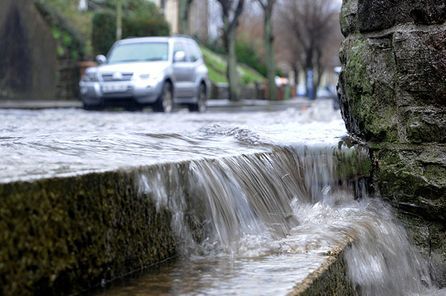
© Northcliffe Media
The soggy aftermath of Britain's record-breaking wet summer will increase the risk of winter floods, say experts.
Months of monsoon-like weather has left the ground unusually waterlogged for the time of year.
Under the present conditions, any spell of heavy rain might be enough to cause further serious flooding like that which swamped many homes and businesses this summer in the Westcountry and across Britain.
In contrast to last winter's drought, November to April is traditionally the wettest time of year, when soils around most of the country are close to saturation. Much of the land in the Westcountry remains usually waterlogged for the time of year - putting areas of the region under further risk of flooding.
Homeowners and businesses have been warned to prepare for more flooding misery in the region. About a month's worth of rain has already fallen in Devon and Cornwall during the first half of October.
Helen Chivers, of the Exeter-based Met Office, said: "The ground is very saturated following the unusually wet summer. Therefore at the moment there is a heightened risk of flooding.
"But things can change very quickly and we are expecting a lot of dry weather over the next week."
She said the Met Office does not expect an "unusual" period of rain over the month.
Average rainfall nationwide in November is 144mm.
"During the next 30 days the expected rainfall is around normal. There will be dry spells and wet spells, but nothing unusual. We would recommend people keep up-to-date with the latest forecasts to be prepared."
The Environment Agency has advised people in South West to prepare for the worst. Some 67,000 properties are said to be currently protected from damage by flood defences.
Paul Mustow, head of flood incidence management at the Environment Agency, said the winter risk of flooding was "relatively heightened" but he did not expect to see "extreme flood events".
Paul Gainey, Environment Agency spokesman for the South West, said: "The weather has been all over the place in recent months. We've had the driest spring and the wettest April to June on record. Over the winter we would expect more prolonged periods of rain.
"More heavy rain could potentially lead to flooding. Land is saturated and the rivers are close to full. With more rain they could reach the point when flooding is more likely.
He advised people to take steps to protect their homes.
"The weather extremes show the need to be prepared. People need to take their own initiative and take action to protect their homes. Those living near rivers, on the coast and in low-lying areas may be at greater risk of flooding.
"We have a free flood warning system, which we would recommend people sign up with. This system will warn you if your property is at risk of being flooded.
Sarah Jackson, the Met Office's chief adviser to the Government, said: "We are coming into a period which is traditionally the wetter period. Because the ground is so wet, if we do have any prolonged heavy rainfall in any part of the country, there is going to be heightened risk."
Ms Chivers said there was no clear evidence of a climate change contributing to the wet summer.
"There is no conclusive link between the wet summer and global warming. Any one of a number of causes could have contributed, including global warming. It's something we're continually researching."
More than 120mm of rain have already fallen in Devon and Cornwall this month, compared with 94mm in Devon and 79mm in Cornwall last month.
An unprecedented turnaround resulted in the driest March on record giving way to the highest level of April to July rainfall seen in England and Wales since 1766.
"It was like a bomb going off" - 'Meteorite' prompts Devon and Cornwall tremor reports
and now this:
Winter floods are on the way to Devon and Cornwall
Looks like a case of cosmic-induced climate change, if you ask me.
Worth looking into for other incidences.